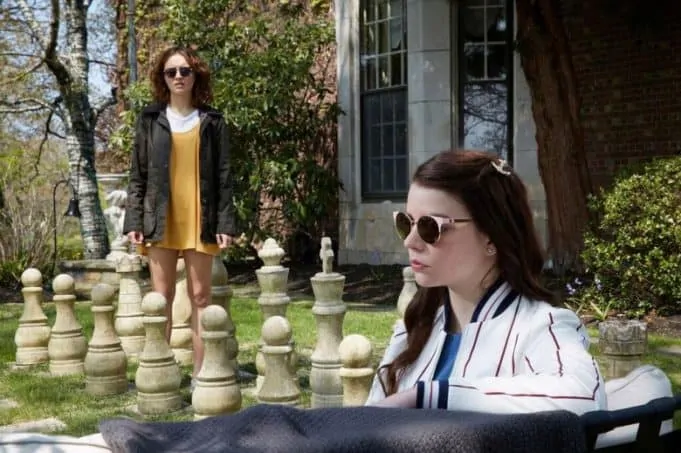Cory Finley’s satirical social commentary, Thoroughbreds, about two Connecticut teens is an eye-catching film with haunting images. The film is both stylish and poignant, and its debut at the Sundance Film Festival was triumphant for “Sundance’s hottest first-time director.”
Amanda (Olivia Cooke) is deposited outside Lily’s palatial home one day. She takes in the haughty grandeur of the mansion, then rings the doorbell. And we follow her as she enters a world which will change hers forever.
Lily (Aya Taylor-Joy) and Amanda knew each other as youngsters with a love of thoroughbreds, and entered the same equestrian competitions in smart riding gear. Then events sent them along different paths. Now Lily is polished and upper class in her demeanor, with a successful future virtually assured. And Amanda? She has become an outcast in their social circle, and projects herself as being free of all emotion. They come together at this time because Amanda needs a tutor and her mother was able to persuade Lily to be that person.
As Amanda waits downstairs for Lily, she becomes curious about the palatial home and starts to explore. We are introduced to Lily’s world by framed family photos of Lily’s late father standing over his kill; a samurai sword above the fireplace; and an envelope full of cash with Lily’s name on it, resting on a balustrade.
And then they meet. Amanda is indifferent but curious. She describes herself: “I have to work a little harder than others to be good.” Lily is polite but distant. Their dialogue is double-edged in exchanges about the cost of their “playdate” and why Lily accepted the job when no one else in their circle would.
Mark (Paul Sparks) walks in; he is the classic hateful step-dad. Lily’s remarks to him are ice-cold. His long stare at Amanda is fiercely inappropriate. Mark exits. Amanda says, “Wow! You hate him!” And they begin to bond.
Killing Mark becomes a topic of discussion in the mansion where they are frequently alone, and just outside where they reposition oversized chess pieces on an outdoor chess board. On one occasion during a “cost-benefit analysis” in Lily’s home, Amanda and Lily discuss their options standing on either side of a painting of a rhinoceros charging. Mark can be heard upstairs on his state-of-the-art rowing machine. The sound of his rowing seems to fill the house.
Simply walking through the house in order to find her mother becomes an angst-ridden journey for Lily – up and down long corridors and staircases searching for a person who seems to be absent in more ways than one. Dining together at home reveals far too many silences and no occasion for warmth between Lily, her mother and her disagreeable stepfather. There are secrets here.
Cory Finley’s script, Lyle Vincent’s vivid cinematography and musical interludes chosen by Erik Friedlander combine to offer a witty but devastating portrait of upper-class suburban life where financial wealth outweighs other concerns.
Finley was a playwright before creating this screenplay. He has a gift for dialogue, and creates scenes where Cooke and Taylor-Joy have ample opportunity to establish complex personas and play out undercurrents. Their performances take you to the edge, and you are fascinated. Silences and pauses are employed throughout the screenplay, reminiscent of Harold Pinter, who is Finley’s hero.
I always write toward things that make me nervous or uncomfortable or afraid.
Strong performances here by Olivia Cooke and Anya Taylor-Joy. At first meeting, Amanda’s right-on wit and her firm belief that she is beyond experiencing emotion contrast sharply with Lily’s closed-in personality and careful choice of words. But then things change.
Said Finley in an online interview a year ago: “I always write toward things that make me nervous or uncomfortable or afraid.” He also said, “We all just believed in going for the boldest version of every moment in the script.”
A riveting film experience; your eyes won’t leave the screen.



